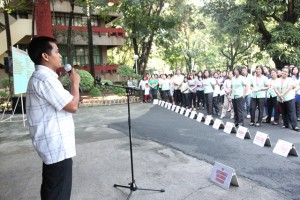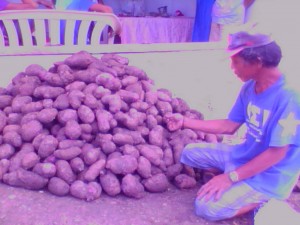
When Jolly Quinto and Allan Mahinay of San Francisco, Quezon became beneficiaries of the Sustainable Livelihood Program (SLP) of the Department of Social Welfare and Development (DSWD) in April 2014, their lives started to get better.
Jolly is the President of Ube Harvesters Self-Employment Assistance-Kaunlaran (SEA-K), while Allan headed the Sto. Niño Ube Producers Association, both local farmer-producers of purple yam or ‘ube.’
Jolly and Allan narrated before officials and employees of the DSWD during the Department’s flag raising ceremony at the Central Office on Monday how the program helped improve their lives.
“Malaki po talagang tulong ang naibigay ng DSWD sa aming magtatanim ng ube sa San Francisco. Hindi na namin kailangan mangutang sa iba na may malaking tubo upang makapagsimula kami sa pagtatanim ng ube (The assistance provided by DSWD is really a big help to us. We do not have to borrow money with huge interest just so we could start planting),” they said.
Planting season for ube is in April and May, while harvest time is from December to January. Ube is a root crop commonly used as ingredient to prepare desserts and breads.
Allan added, “Hindi lang kapital ang naibigay ng DSWD sa aming grupo, nabigyan din kami ng kasanayan o training sa tamang paghahanda ng lupa, pag-aabono, gayundin ang marketing ng aming mga produkto (DSWD has not only given our group the needed capital, but also skills training in preparing the land, using fertilizer, and in marketing our products).”
Jolly said that ube planting is financially rewarding as farmers can double their profits for growing the root crops.
He said that there is ‘gold’ in ube because it is easy to cultivate, as long as it is properly cared for throughout the year. Being aware of the basic soil, sun, and water preferences will result in healthier harvests.

“Ang pagbabago ay dapat magsimula muna sa ating sarili. Kalakip ng sikap at tiyaga at suporta ng pamahalaan, makakamit natin ang positibong pagbabago (Transformation should start within ourselves. Coupled with perseverance, determination, and government support, we can change our lives),” Jolly said.
SLP is a community-based program aimed at improving the socio-economic status of its participants wherein beneficiaries are thought to mobilize their savings, engage in microenterprise activities, access capital resources, or receive institutional development support.
It has two tracks: Micro-Enterprise Development Track which support micro-enterprise in becoming organizationally and economically viable; and Employment Facilitation Track which assists participants to access appropriate employment opportunities.
As of July 2014, a total of 210,166 families were served by the 770 projects SLP has implemented with public and private sectors.
These projects increased the economic opportunities of the families by strengthening values and skills formation, increasing access to credit, savings and micro-finance, improving product development and marketing, and providing pre-employment training and direct employment. ###


